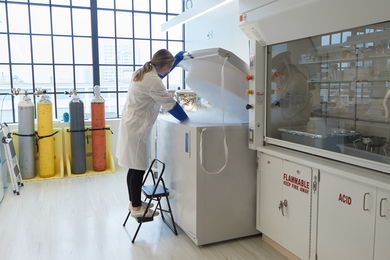A Wellesley College student who was a summer boarder at an MIT fraternity house was found dead in her room on July 2. Senior Associate Dean Robert M. Randolph said a note was discovered at the scene. Cambridge police said it appeared to be a suicide.
The next day, President Charles M. Vest sent the following message to members of the MIT community:
"Campus experience embodies youth, discovery, opportunity and affirmation of life. This is the source of joy for all of us who study, live and work here at MIT. Unfortunately, however, we are never shielded completely from human tragedies. Our campus, like others, has been visited all too often by the stark reality of youthful death.
"Twice in this past academic year, MIT students have taken their own lives in our midst. Yesterday evening, a young woman whose only known connection to our community was to rent a room for the summer in one of our fraternities, also apparently died of her own volition.
"For many decades, institutional and journalistic wisdom has been that suicides should be handled discreetly with primary emphasis on personal and family privacy. Indeed, one of the leading national experts on this topic has recently stated that suicides should not be played out on the front pages of newspapers. We recognize the need to respect the privacy of individuals, but the problem must be addressed openly, because it is one of increasing intensity. Indeed, the Centers for Disease Control has stated that from 1952 to 1995, suicides among adolescents nearly tripled.
"Suicide results from enormous personal pain, but it also inflicts great distress on family, friends and community. We are all saddened, but also injured by such deaths.
"Each suicide that has occurred at MIT has involved a unique set of personal issues. Most have involved broken personal relationships. Some of these students came to MIT with deep, pre-existing emotional difficulties. Others, to the best of our knowledge, did not. Alcohol and drugs appear to have been factors for some, but not for others. Academic difficulties almost never appear to be a central issue.
"During the past eight months our Task Force on Mental Health Services has worked to suggest ways in which the availability and effectiveness of our medical and counseling services can be improved for all members of our community. Beyond this broad review of accessibility, we will continue to focus on how best to identify and help those students with particularly serious difficulties. We hope to learn and improve the help we provide to such students, but we also know that there are no simple solutions, here at MIT or elsewhere.
"One thing we do know is that each of us can help by being caring and alert. We must be willing not only to provide or seek support for other members of our community, but also to recognize when we ourselves need help in handling the complexities and stresses of life.
"MIT is not alone in facing the troubling phenomenon of youthful suicide, but we must redouble our efforts to strengthen our sense of community and mutual support.
"Finally, I would like to take this opportunity to thank and salute the many members of our Dean's Office, counseling services, housing systems, Medical Department and Campus Police who work so hard to serve the needs of our students, often in very complex and trying circumstances."
The fraternity, Alpha Tau Omega, has about 25 summer boarders, including five others from Wellesley. Ten members of the chapter are also living at the house during the summer.
"We at ATO are truly saddened by the unexpected death of one of our summer boarders," said George Gluck, a senior in biology and ATO's president. "Our hearts go out to her friends and family as well as to all others affected by this tragedy."
A version of this article appeared in MIT Tech Talk on July 18, 2001.





